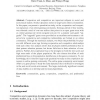Free Online Productivity Tools
i2Speak
i2Symbol
i2OCR
iTex2Img
iWeb2Print
iWeb2Shot
i2Type
iPdf2Split
iPdf2Merge
i2Bopomofo
i2Arabic
i2Style
i2Image
i2PDF
iLatex2Rtf
Sci2ools
HCI
2007
2007
Cooperation and Competition Dynamics in an Online Game Community
Cooperation and competition are important subjects in social and economical studies. Similar dynamics exists in large-scale online communities. In this paper, we present a quantitative study on the cooperation and competition dynamics of an online gaming community. During a period of four months, we collected a total of over one million data points in an open game room with an online gaming site (www.ourgame.com.cn) for a popular card game “upgrade”. The “upgrade” game room provided us an excellent environment to observe how cooperative and competitive relationships are formed in an online community. Through the statistical analysis, we obtain the probability for players with different score tags forming cooperative and competitive relationships with each other. Our analysis shows that all players exhibit preferential bias in their partner selection process, but shows little bias in their selection of competitors. Further, the cooperation bias is the strongest in both the low s...
HCI 2007 | Human Computer Interaction | Online Gaming | Online Gaming Community | Preferential Bias |
| Added | 29 Oct 2010 |
| Updated | 29 Oct 2010 |
| Type | Conference |
| Year | 2007 |
| Where | HCI |
| Authors | Ruixi Yuan, Li Zhao, Wenyu Wang |
Comments (0)

